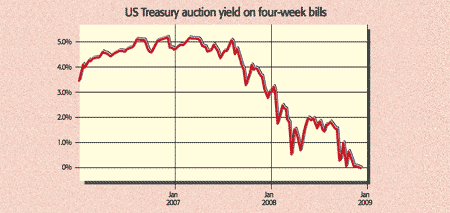Get the latest financial news, insights and expert analysis from our award-winning MoneyWeek team, to help you understand what really matters when it comes to your finances.
You are now subscribed
Your newsletter sign-up was successful
Want to add more newsletters?

Twice daily
MoneyWeek
Get the latest financial news, insights and expert analysis from our award-winning MoneyWeek team, to help you understand what really matters when it comes to your finances.

Four times a week
Look After My Bills
Sign up to our free money-saving newsletter, filled with the latest news and expert advice to help you find the best tips and deals for managing your bills. Start saving today!
It was the 'cut out and keep' edition of the US Treasury's regular bond auctions, says FT Alphaville. Demand for government debt is so great that the Treasury sold $30bn of four-week bills at a 0% interest rate for the first time ever in its latest auction; it could have sold four times as much at the same rate. Three-month bill rates turned negative in the secondary market for the first time since America began selling the debt in 1929. Yields on two-, ten- and 30-year bonds reached record lows.
Yields that low look like madness. David Rosenberg of Merrill Lynch, a bond bull for many years, has been writing for some weeks that Treasuries are "clearly heading into a bubble phase". Other commentators are now coming round to his view. "Treasuries have some bubble characteristics, certainly the Treasury bill does," says Bill Gross of Pimco, which runs the world's largest bond fund. "A Treasury bill at 0% is overvalued. Who could argue with that in terms of the return relative to the risk? There is no return." GaveKal, the consultancy part-owned by Anatole Kaletsky of The Times, was even blunter: "Getting out of government bonds today is not only necessary, but could be urgent."
But are Treasuries truly in a bubble? Dan Siever on MarketWatch.com argues not. Unlike a bubble, bonds are rallying because of fear, not greed. Investors are so scared firms are insolvent that they're unwilling to lend them any money; instead they'll invest in US government debt at no return, or even a small loss, to be certain their money will be returned.
MoneyWeek
Subscribe to MoneyWeek today and get your first six magazine issues absolutely FREE

Sign up to Money Morning
Don't miss the latest investment and personal finances news, market analysis, plus money-saving tips with our free twice-daily newsletter
Don't miss the latest investment and personal finances news, market analysis, plus money-saving tips with our free twice-daily newsletter

Regardless of whether Treasuries are in a bubble or are rightly pricing in a Japan-scenario, these record low rates on government debt are not good news. There's an email, allegedly from Warren Buffett, in circulation that sums it up: "This should be bullish for Berkshire [Hathaway, his investment vehicle]. With great foresight, I long ago entered the mattress business in a big way through our furniture operation. Now mattresses have become fully competitive as a place to put your money, and sales will soon take off."
More seriously, while government bond yields have collapsed, yields are soaring on the debt that investors have dumped. "Corporate bonds look like they're pricing in an environment akin to the 1930s," says James Montier of Socit Gnrale. "The spread between BAA and US Treasuries is as high as it's been since the Great Depression. Currently it stands at over 550bp; at the depths of the Depression it was just over 700bp." (A BAA rating means a bond towards the lower end of investment grade.)
"Essentially the Fed [is] poking people to take risk," says Stephanie Pomboy of MacroMavens in Barron's. "They are taxing people by having negative real returns on cash. At the same time yields on investment-grade and junk bonds are incredibly alluring... at some point, the cattle prod will get people moving." She expects a short-term bear-market rally in junk debt, but "if I was going to hold my nose and buy anything, I would probably buy higher-quality corporate credits".
Get the latest financial news, insights and expert analysis from our award-winning MoneyWeek team, to help you understand what really matters when it comes to your finances.
MoneyWeek is written by a team of experienced and award-winning journalists, plus expert columnists. As well as daily digital news and features, MoneyWeek also publishes a weekly magazine, covering investing and personal finance. From share tips, pensions, gold to practical investment tips - we provide a round-up to help you make money and keep it.
-
 Can mining stocks deliver golden gains?
Can mining stocks deliver golden gains?With gold and silver prices having outperformed the stock markets last year, mining stocks can be an effective, if volatile, means of gaining exposure
-
 8 ways the ‘sandwich generation’ can protect wealth
8 ways the ‘sandwich generation’ can protect wealthPeople squeezed between caring for ageing parents and adult children or younger grandchildren – known as the ‘sandwich generation’ – are at risk of neglecting their own financial planning. Here’s how to protect yourself and your loved ones’ wealth.

